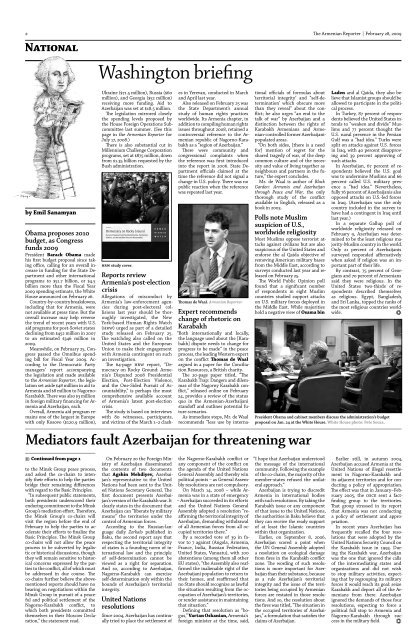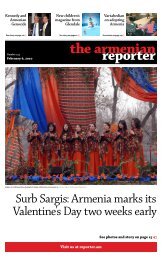National, International, Armenia, and Community News and Opinion
National, International, Armenia, and Community News and Opinion
National, International, Armenia, and Community News and Opinion
Create successful ePaper yourself
Turn your PDF publications into a flip-book with our unique Google optimized e-Paper software.
The <strong>Armenia</strong>n Reporter | February 28, 2009<br />
<strong>National</strong><br />
Washington briefing<br />
by Emil Sanamyan<br />
Obama proposes 2010<br />
budget, as Congress<br />
funds 2009<br />
President Barack Obama made<br />
his first budget proposal since taking<br />
office, calling for an overall increase<br />
in funding for the State Department<br />
<strong>and</strong> other international<br />
programs to $51.7 billion, or $4.5<br />
billion more than the Fiscal Year<br />
2009 spending estimate, the White<br />
House announced on February 26.<br />
Country-by-country breakdowns,<br />
including that for <strong>Armenia</strong>, were<br />
not available at press time. But the<br />
overall increase may help reverse<br />
the trend of recent years with U.S.<br />
aid programs for post-Soviet states<br />
declining from $452 million in 2007<br />
to an estimated $346 million in<br />
2009.<br />
Meanwhile, on February 25, Congress<br />
passed the Omnibus spending<br />
bill for Fiscal Year 2009. According<br />
to the Democratic Party<br />
managers’ report accompanying<br />
the legislation <strong>and</strong> made available<br />
to the <strong>Armenia</strong>n Reporter, the legislation<br />
set aside $48 million in aid to<br />
<strong>Armenia</strong> <strong>and</strong> $8 million to Nagorno-<br />
Karabakh. There was also $3 million<br />
in foreign military financing for <strong>Armenia</strong><br />
<strong>and</strong> Azerbaijan, each.<br />
Overall, <strong>Armenia</strong> aid program remains<br />
one of the largest in Europe<br />
with only Kosovo ($120.9 million),<br />
Ukraine ($71.5 million), Russia ($60<br />
million), <strong>and</strong> Georgia ($52 million)<br />
receiving more funding. Aid to<br />
Azerbaijan was set at $18.5 million.<br />
The legislation mirrored closely<br />
the spending levels proposed by<br />
the House Foreign Operations Subcommittee<br />
last summer. (See this<br />
page in the <strong>Armenia</strong>n Reporter for<br />
July 17, 2008.)<br />
There is also substantial cut in<br />
Millennium Challenge Corporation<br />
programs, set at $875 million, down<br />
from $1.35 billion requested by the<br />
Bush administration.<br />
HRW study cover.<br />
Reports review<br />
<strong>Armenia</strong>’s post-election<br />
crisis<br />
Allegations of misconduct by<br />
<strong>Armenia</strong>’s law-enforcement agencies<br />
during post-electoral collisions<br />
last year should be thoroughly<br />
investigated, the New<br />
York-based Human Rights Watch<br />
(HRW) urged as part of a detailed<br />
study released on February 25.<br />
The watchdog also called on the<br />
United States <strong>and</strong> the European<br />
Union to make their engagement<br />
with <strong>Armenia</strong> contingent on such<br />
an investigation.<br />
The 64-page HRW report, “Democracy<br />
on Rocky Ground: <strong>Armenia</strong>’s<br />
Disputed 2008 Presidential<br />
Election, Post-Election Violence,<br />
<strong>and</strong> the One-Sided Pursuit of Accountability,”<br />
is perhaps the most<br />
comprehensive available account<br />
of <strong>Armenia</strong>’s latest post-election<br />
crisis.<br />
The study is based on interviews<br />
with 80 witnesses, participants,<br />
<strong>and</strong> victims of the March 1–2 clashes<br />
in Yerevan, conducted in March<br />
<strong>and</strong> April last year.<br />
Also released on February 25 was<br />
the State Department’s annual<br />
study of human rights practices<br />
worldwide. Its <strong>Armenia</strong> chapter, in<br />
addition to compiling human rights<br />
issues throughout 2008, retained a<br />
controversial reference to the <strong>Armenia</strong>n<br />
republic of Nagorno-Karabakh<br />
as a “region of Azerbaijan.”<br />
There were community <strong>and</strong><br />
congressional complaints when<br />
the reference was first introduced<br />
into the report in 2006. State Department<br />
officials claimed at the<br />
time the reference did not signal a<br />
change in U.S. policy. There was no<br />
public reaction when the reference<br />
was repeated last year.<br />
Thomas de Waal. <strong>Armenia</strong>n Reporter.<br />
Expert recommends<br />
change of rhetoric on<br />
Karabakh<br />
“Both internationally <strong>and</strong> locally,<br />
the language used about the [Karabakh]<br />
dispute needs to change for<br />
progress to be made” in the peace<br />
process, the leading Western expert<br />
on the conflict Thomas de Waal<br />
argued in a paper for the Conciliation<br />
Resources, a British charity.<br />
The 20-page paper titled, “The<br />
Karabakh Trap: Dangers <strong>and</strong> dilemmas<br />
of the Nagorny Karabakh conflict,”<br />
released online on February<br />
24, provides a review of the status<br />
quo in the <strong>Armenia</strong>n-Azerbaijani<br />
st<strong>and</strong>off <strong>and</strong> outlines potential future<br />
scenarios.<br />
As immediate steps, Mr. de Waal<br />
recommends “less use by international<br />
officials of formulas about<br />
‘territorial integrity’ <strong>and</strong> “self-determination’<br />
which obscure more<br />
than they reveal” about the conflict;<br />
he also urges “an end to the<br />
talk of war” by Azerbaijan <strong>and</strong> a<br />
distinction between the rights of<br />
Karabakh <strong>Armenia</strong>ns <strong>and</strong> <strong>Armenia</strong>n-controlled<br />
former Azerbaijanipopulated<br />
areas.<br />
“On both sides, [there is a need<br />
for] mention of regret for the<br />
shared tragedy of war, of the deep<br />
common culture <strong>and</strong> of the necessity<br />
<strong>and</strong> value of living together as<br />
neighbours <strong>and</strong> partners in the future,”<br />
the expert concludes.<br />
Mr. de Waal is author of Black<br />
Garden: <strong>Armenia</strong> <strong>and</strong> Azerbaijan<br />
through Peace <strong>and</strong> War, the only<br />
thorough study of the conflict<br />
available in English, released as a<br />
book in 2003.<br />
Polls note Muslim<br />
suspicion of U.S.,<br />
worldwide religiosity<br />
Most Muslims oppose terrorist attacks<br />
against civilians but are also<br />
suspicious of the United States <strong>and</strong><br />
endorse the al Qaida objective of<br />
removing American military bases<br />
from the Middle East, according to<br />
surveys conducted last year <strong>and</strong> released<br />
on February 25.<br />
The World Public <strong>Opinion</strong> poll<br />
found that a significant number<br />
of respondents in eight Muslim<br />
countries studied support attacks<br />
on U.S. military forces deployed in<br />
the Middle East. While majorities<br />
hold a negative view of Osama bin<br />
Mediators fault Azerbaijan for threatening war<br />
Laden <strong>and</strong> al Qaida, they also believe<br />
that Islamist groups should be<br />
allowed to participate in the political<br />
process.<br />
In Turkey, 87 percent of respondents<br />
believed the United States intends<br />
to “weaken <strong>and</strong> divide” Muslims<br />
<strong>and</strong> 77 percent thought the<br />
U.S. naval presence in the Persian<br />
Gulf was a “bad idea.” Turks were<br />
split on attacks against U.S. forces<br />
in Iraq, with 40 percent disapproving<br />
<strong>and</strong> 39 percent approving of<br />
such attacks.<br />
In Azerbaijan, 67 percent of respondents<br />
believed the U.S. goal<br />
was to undermine Muslims <strong>and</strong> 66<br />
percent called U.S. military presence<br />
a “bad idea.” Nevertheless,<br />
fully 76 percent of Azerbaijanis also<br />
opposed attacks on U.S.-led forces<br />
in Iraq. (Azerbaijan was the only<br />
country included in the survey to<br />
have had a contingent in Iraq until<br />
last year.)<br />
In a separate Gallup poll of<br />
worldwide religiosity released on<br />
February 9, Azerbaijan was determined<br />
to be the least religious majority-Muslim<br />
country in the world.<br />
Only 21 percent of Azerbaijanis<br />
surveyed responded affirmatively<br />
when asked if religion was an important<br />
part of their life.<br />
By contrast, 75 percent of Georgians<br />
<strong>and</strong> 70 percent of <strong>Armenia</strong>ns<br />
said they were religious. In the<br />
United States two-thirds of respondents<br />
described themselves<br />
as religious. Egypt, Bangladesh,<br />
<strong>and</strong> Sri Lanka, topped the ranks of<br />
the most religious countries worldwide.<br />
f<br />
President Obama <strong>and</strong> cabinet members discuss the administration’s budget<br />
proposal on Jan. 24 at the White House. White House photo: Pete Souza.<br />
n Continued from page <br />
to the Minsk Group peace process,<br />
<strong>and</strong> asked the co-chairs to intensify<br />
their efforts to help the parties<br />
bridge their remaining differences<br />
with regard to the Basic Principles.<br />
“In subsequent public statements,<br />
both presidents underscored their<br />
enduring commitment to the Minsk<br />
Group’s mediation effort. Therefore,<br />
the Minsk Group’s co-chairs will<br />
visit the region before the end of<br />
February to help the parties to accelerate<br />
their efforts to finalize the<br />
Basic Principles. The Minsk Group<br />
co-chairs will not allow the peace<br />
process to be subverted by legalistic<br />
or historical discussions, though<br />
they will remain sensitive to historical<br />
concerns expressed by the parties<br />
to the conflict, all of which must<br />
be addressed in due course. The<br />
co-chairs further believe the abovementioned<br />
reports should have no<br />
bearing on negotiations within the<br />
Minsk Group in pursuit of a peaceful<br />
<strong>and</strong> political settlement of the<br />
Nagorno-Karabakh conflict, to<br />
which both presidents committed<br />
themselves in their Moscow Declaration,”<br />
the statement read.<br />
On February 20 the Foreign Ministry<br />
of Azerbaijan disseminated<br />
the contents of two documents<br />
that Agshin Mehdiyev, Azerbaijan’s<br />
representative to the United<br />
Nations had been sent to the United<br />
Nations Secretary General. The<br />
first document presents Azerbaijan’s<br />
version of the Karabakh war. It<br />
clearly states in the document that<br />
Azerbaijan can “liberate by military<br />
means” the territories under the<br />
control of <strong>Armenia</strong>n forces.<br />
According to the Russian-language<br />
daily Zerkalo published in<br />
Baku, the second report says that<br />
respecting the territorial integrity<br />
of states is a founding norm of international<br />
law <strong>and</strong> the principle<br />
of self-determination cannot be<br />
viewed as a right for separation.<br />
And so, according to Azerbaijan,<br />
Nagorno-Karabakh can exercise<br />
self-determination only within the<br />
bounds of Azerbaijan’s territorial<br />
integrity.<br />
United Nations<br />
resolutions<br />
Since 2004, Azerbaijan has continually<br />
tried to place the settlement of<br />
the Nagorno-Karabakh conflict or<br />
any component of the conflict on<br />
the agenda of the United Nations<br />
General Assembly <strong>and</strong> thereby win<br />
political points – as General Assembly<br />
resolutions are not compulsory.<br />
On March 14, 2008 – while <strong>Armenia</strong><br />
was in a state of emergency<br />
– Azerbaijan succeeded in its efforts<br />
<strong>and</strong> the United Nations General<br />
Assembly adopted a resolution “reaffirming<br />
the territorial integrity of<br />
Azerbaijan, dem<strong>and</strong>ing withdrawal<br />
of all <strong>Armenia</strong>n forces from all occupied<br />
territories there.”<br />
By a recorded vote of 39 in favor<br />
to 7 against (Angola, <strong>Armenia</strong>,<br />
France, India, Russian Federation,<br />
United States, Vanuatu), with 100<br />
abstentions (among them all other<br />
EU states), “the Assembly also reaffirmed<br />
the inalienable right of the<br />
Azerbaijani population to return to<br />
their homes, <strong>and</strong> reaffirmed that<br />
no State should recognize as lawful<br />
the situation resulting from the occupation<br />
of Azerbaijan’s territories,<br />
or render assistance in maintaining<br />
that situation.”<br />
Defining that resolution as “bogus,”<br />
Vartan Oskanian, <strong>Armenia</strong>’s<br />
foreign minister at the time, said,<br />
“I hope that Azerbaijan understood<br />
the message of the international<br />
community. Following the example<br />
of the co-chairs, the majority of the<br />
member-states refused the unilateral<br />
approach.”<br />
Azerbaijan is trying to discredit<br />
<strong>Armenia</strong> in international bodies<br />
with such resolutions. By taking the<br />
Karabakh issue or any component<br />
of that issue to the United Nations,<br />
the authorities in Baku believe that<br />
they can receive the ready support<br />
of at least the Islamic countries<br />
within that organization.<br />
Earlier, on September 8, 2006,<br />
Azerbaijan scored a point when<br />
the UN General Assembly adopted<br />
a resolution on ecological damage<br />
from fires in the Karabakh conflict<br />
zone. The wording of such resolutions<br />
is more important for Azerbaijan<br />
than their substance, because<br />
as a rule Azerbaijan’s territorial<br />
integrity <strong>and</strong> the issue of the territories<br />
being occupied by <strong>Armenia</strong>n<br />
forces are restated in those resolutions.<br />
And so, the resolution about<br />
the fires was titled, “The situation in<br />
the occupied territories of Azerbaijan,”<br />
a formulation that satisfies the<br />
claims of Azerbaijan.<br />
Earlier still, in autumn 2004,<br />
Azerbaijan accused <strong>Armenia</strong> at the<br />
United Nations of illegal resettlement<br />
in Nagorno-Karabakh <strong>and</strong><br />
its adjacent territories <strong>and</strong> for conducting<br />
a policy of appropriation.<br />
The effect was that in January–February<br />
2005, the OSCE sent a factfinding<br />
group to the territories.<br />
That group stressed in its report<br />
that <strong>Armenia</strong> was not conducting<br />
a policy of settlement <strong>and</strong> appropriation.<br />
In recent years Azerbaijan has<br />
frequently recalled the four resolutions<br />
that were adopted by the<br />
United Nations Security Council on<br />
the Karabakh issue in 1993. During<br />
the Karabakh war, Azerbaijan<br />
was the one that ignored the calls<br />
of the intermediating states <strong>and</strong><br />
organizations <strong>and</strong> did not wish<br />
to stop military activities, expecting<br />
that by regrouping its military<br />
forces it would reach its goal: seize<br />
Karabakh <strong>and</strong> deport all of the <strong>Armenia</strong>ns<br />
from there. Azerbaijan<br />
ignored the dem<strong>and</strong>s of those four<br />
resolutions, expecting to force a<br />
political full stop to <strong>Armenia</strong> <strong>and</strong><br />
Nagorno-Karabakh through success<br />
in the military field. f

















